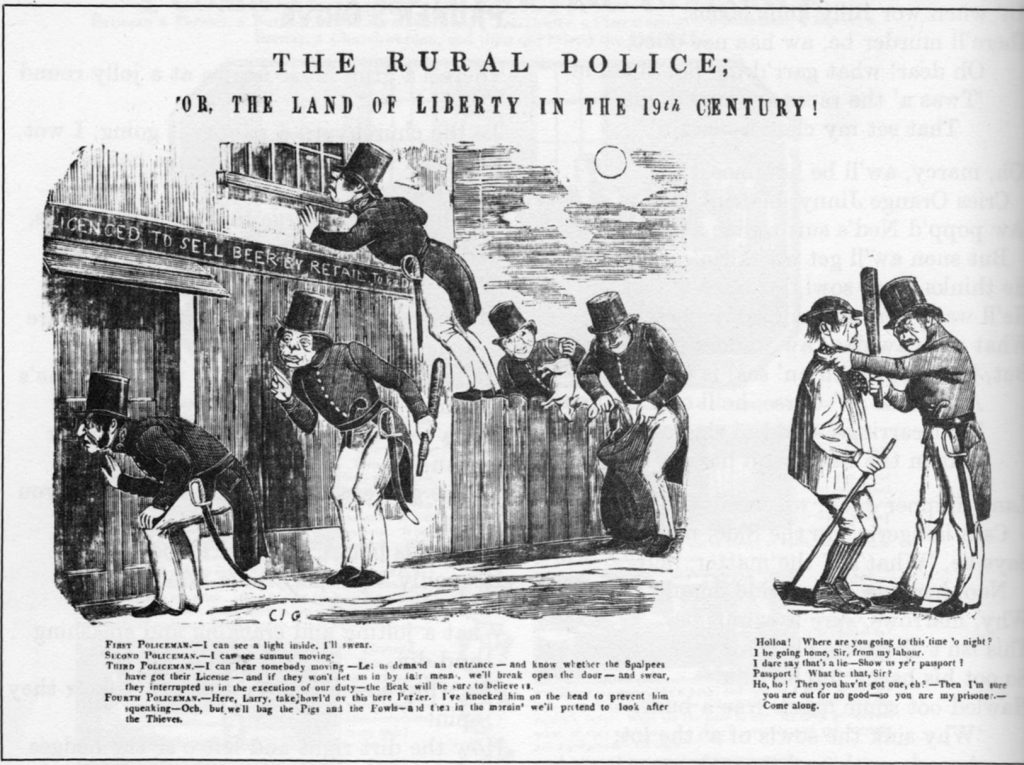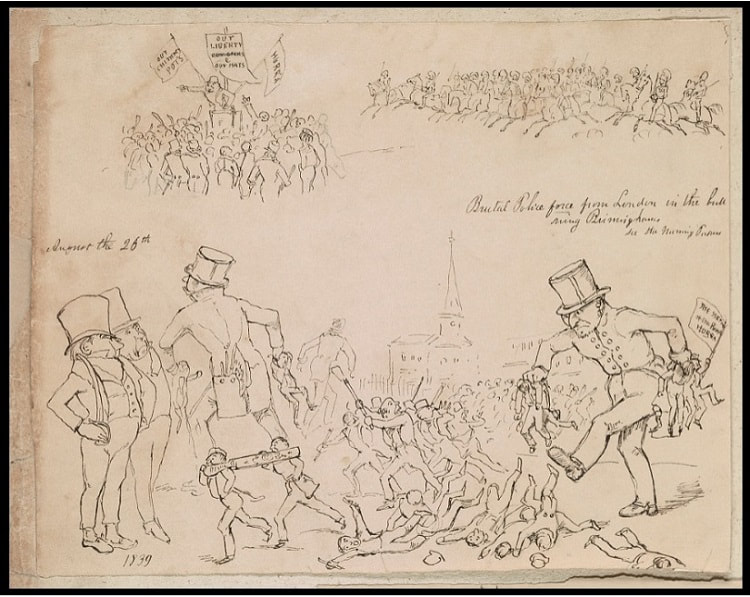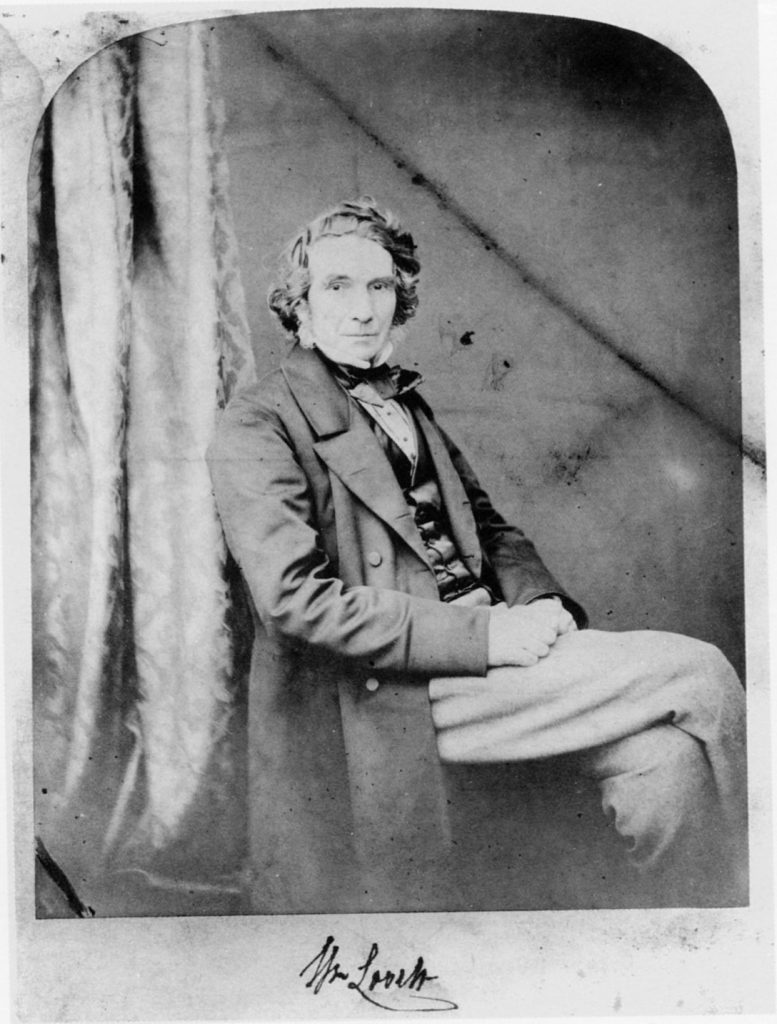An extract from the book, 1839: the Chartist Insurrection by David Black and Chris Ford.

The dialogue reads (picture on the left):
First Policeman: I can see a light inside. I swear.
Second Policeman: I can see summut moving
Third Policeman – I can hear someone moving – Let us demand an entrance – And know whether spalpeens have got their licence – And if they won’t let us in by fair means, we’ll break open the door – And swear they interrupted us in the execution of our duty – the beak will be sure to believe us.
Fourth Policeman – Here Larry, take hold of this here porker. I’ve knocked him on the head to prevent him squeaking – Oh, but we’ll bag the pigs and the fowls – And then in the mornin’ we’ll pretend to look after the thieves.
(picture on the right:
Holloa! Where are you going to this time o’ night?
I be going home Sir. From my labour.
I dare say that’s a lie. Show us y’er passport!
Passport? What be that, Sir?
Ho, ho! Then you haven’t got one, eh? – Then I’m sure you’re out for no good –so you are my prisoner – Come along.
The County Police Act 1839, also known as the Rural Police Act, enabled Justices of the Peace in England and Wales to establish police forces in their counties. The move to expand the police was not welcomed by everyone. Radicals, who had experienced the brutality of the London Metropolitan Police during the Chartists agitation of 1839, saw the new police forces as a threat to free speech and right of assembly.

Today the London Metropolitan Police has reputation for institutional corruption and abuse of powers. I was ever thus. As William Lovett put it in 1839, “the institution of a police force is an infringement on the constitution and liberties possessed by our ancestors.”

As described in our book, 1839:
As the House of Commons in London was about to debate the Chartist petition for Universal Male Suffrage, the Chartist National Convention – reconvened in Birmingham .
Days later, on 4 July, Birmingham magistrate Dr. Boothe rode into the Bull Ring, a triangular commercial area of the town centre, where an illegal meeting was taking place. His mission was to “ascertain the state of the town,” which he soon did when the large crowd greeted him with shouts of “Spy” and threw stones at him. Rashly, the police tried to snatch the speaker by wading into the crowd and wielding their batons, until they were beaten back by the angry crowd. Dr. Boothe rode off and soon returned with a company of cavalry. He placed himself under the Nelson Monument and read the Riot Act. The dragoons drew their sabres and moved into the Bull Ring. The crowd withdrew but remained on the streets until after midnight, some armed with clubs and iron railings torn from churches, chanting “Fall Tyrants Fall!”
Reporter John Hampden wrote in The Planet:
“Wanton outrages were perpetrated by the police sent down by Lord J. Russell, at the instigation of the Birmingham magistrates, not only upon the Chartists assembled in the Bull Ring, but also upon harmless and unoffending people in the streets… who ought to have been protected, instead of being maltreated. Arms-breaking and head-breaking, however, seem to have been practiced by way of diversion; it was, no doubt, fine fun to see a fellow go off with a fractured limb, and an exceedingly good joke to hear a woman beaten by the police ruffians, cry out against the brutality… it mattered little whether they were man, woman or child… Are not these circumstances calculated to rouse up all that is manly – all that is English – in our countrymen and produce a universal shout of execration against such tyranny and injustice?”
The Convention met the next day in Lawrence Street and, on London delegate William Lovett’s initiative, issued a proclamation condemning the magistrates and police for the previous night’s action. Although all delegates were prepared to sign the proclamation, Lovett, in an act of heroic proportions, insisted that he alone would sign because, he declared, “the Convention cannot spare victims.” The proclamation was placarded all over Birmingham, and the authorities responded by arresting Lovett as signatory, and Birmingham delegate John Collins as publisher, of the document. At the court hearing, the Birmingham Recorder asked Lovett, “Were you aware that certain members of the police force were wounded dangerously by weapons?” Lovett replied,
“I heard that several of them were wounded, and at the same time thought that the people were justified in repelling such despotic and bloodthirsty power by any and every means at their disposal, because I believe that the institution of a police force is an infringement on the constitution and liberties possessed by our ancestors; for if the people submit to one injustice after another, which self-constituted authorities impose upon them, they may be eventually ground to dust, without the means of any resistance.”
Collins pointed out that one of the magistrates facing him was in fact Mr. Muntz, a leader of the Birmingham Political Union. Muntz, a moderate, ‘Moral Force’ Chartist, had been elected to the Convention in August 1838, but had never taken his seat.
Bail was granted to both accused.
From: 1839: the Chartist Insurrection by David Black and Chris Ford (Unkant, London: 2012)
